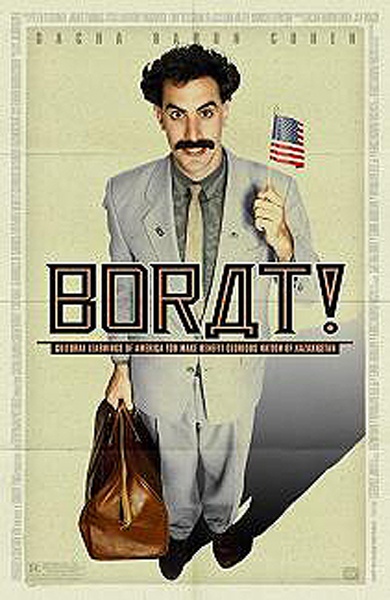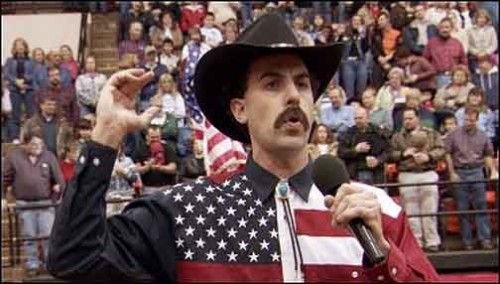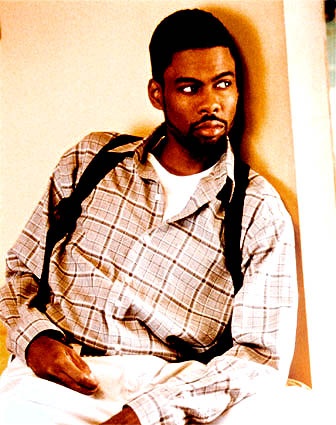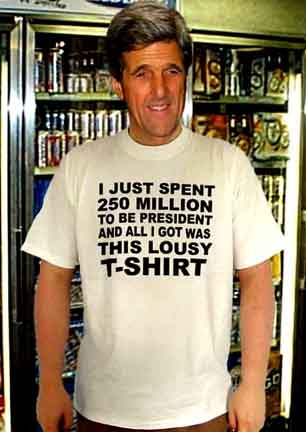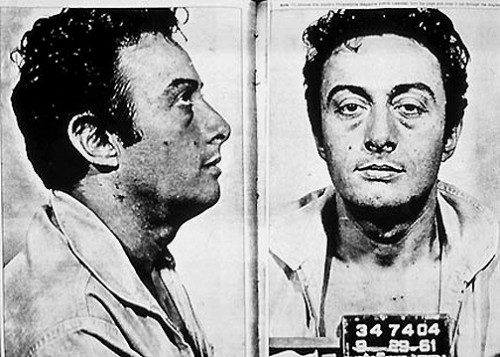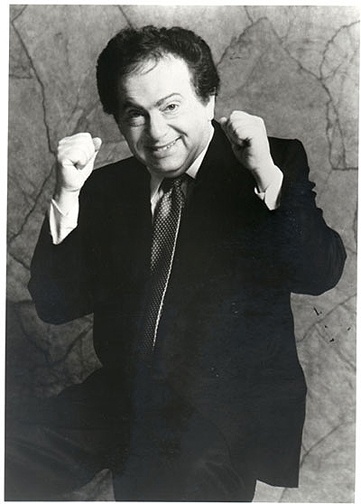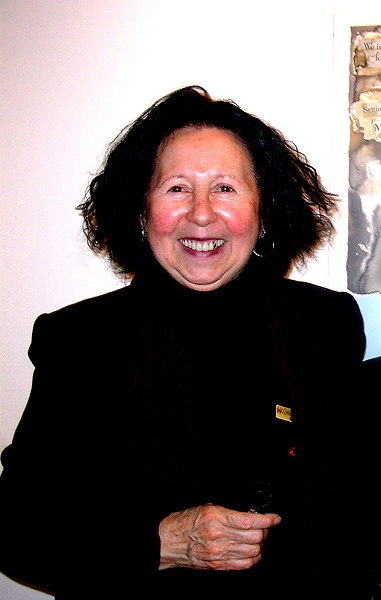Borat and Comedy in America
The Joke's On Us
By: Charles Giuliano - Nov 22, 2006
What's funny about "Borat: Cultural Learnings of America for Make Benefit Glorious Nation of Kazakhstan" is that, despite the rave reviews by critics who hold their noses and laugh their heads off, well, is that actually the film isn't very funny. At least not to me. Sure I laughed a few times at the outrageous absurdity of it all. But most of the incidents weren't all that amusing because they had been so thoroughly discussed in the media that one knew what to expect. There was no element of surprise. Although, perhaps, a bit of rage and outrage.
The gag is that Sacha Cohen, an allegedly devout British Jew, even said to be Orthodox, travels America as a racist, anti Semitic reporter from an obscure country in Eastern Europe, an actual nation so it seems, and bates naïve, innocent Americans to go along with his outrageous Jew bating. Of course he is allowed this because he Is a Jew and therefore in real life cannot possibly be anti Semitic. But the trope is that he is exposing the underbelly of racism and anti Semitism in America. So, what else is new? We assume that because he is Orthodox Cohen/ Borat refrains from anti Semitism on the Sabbath. So, while trekking across America in his ice cream truck with an obscenely, grossly over weight director/ producer and their pet bear, are we to assume that from sundown on Friday through sundown on Saturday he holed up in a motel and kept kosher?
Recently my university staged an adaptation of Voltaire's classic satire "Candide." Students were assigned to view and write about the play. Toward that end the director and a member of the theatre department attended class to discuss satire and Voltaire. They asked if any of the students had seen "Borat?" To which there were a few smiling affirmative responses. It was then suggested that Voltaire was the Borat of his time. That may be a good device to get college students to relate to the issues skewered by the great French philosophe. At the time, I had not seen Borat but asked the two visitors if they had? Actually, "no" was the response. Which of course leads to the question whether, if these adults and professors had actually seen Borat, would they have made the comparison to Voltaire? We are talking Voltaire here; one of the greatest writers who, from time to time, was slapped into the Bastille for courageous and outrageous remarks. Is Borat on the same level as Voltaire? Or deserving of reviews that claim this is the greatest comedy film of the past decade if not century or millennium? Up there with Charlie Chaplin, Buster Keaton, Lord Buckley, Lenny Bruce and Sid Caesar? Not.
As Borat himself learns in a lesson with a comedy coach. Make a statement and then, pause, add Not. The joke is that Borat is learning how to make a joke. Not. At least this segment wasn't gross and tasteless like the nude wrestling scene with his obese director in a hotel that spilled out into the lobby and surprised guests in the elevator. We could go on to rehash all the tasteless and unfunny gags but, by now, you have read or heard them and, if not, let's not spoil the fun if you actually plan to see the stupid film. Hey, I did.
Although Astrid turned down the offer to see it together. She didn't think it was funny when I performed some of the bits from Borat, Ali G, and Bruno that I picked up watching his characters on HBO. Initially they were hilarious. Particularly when Andy Rooney refused to go along with an Ali G interview and terminated the session at which point the rapper accused him of "racialism." One of his tropes is messing up words such as during a dinner party in the film when a guest informs him that he is "retired" which Borat skewers into "retarded."
One of Astrid's points is that too often comedy puts someone down. It is at the expense of others. What about the actual people of Kazakhstan who have been rendered into a global laughing stock? It is an interesting question for someone of my age who grew up in racist America. Don't we all remember the Moron, Polish, Sick, and Dead Baby jokes? They seem to have faded from popular culture. But they have been replaced by the new comedy and flagrant racism of Chris Rock and others. He can say "nigger" and it's funny, because he is black and talking to a black audience. Black kids can roughhouse on the subway and use that word over and over while I sit there and have to listen. But if I say it then I am a racist. So I guess the idea here is that if you are gay you can make gay jokes, if you are Jewish you can make Jewish jokes, if you are black you can make black jokes. But for anyone else, watch out.
Like Michael Richards, the Kramer character on Seinfeld. This past weekend he spewed racial epithets at a heckler during a standup routine at a comedy club. The incident was caught on a cell phone and clips, with blacked out words, were aired on the evening news. The internet ran the entire sequence without the blackouts and proved to be much more damaging that the mercifully brief news bites. You sense that Richards was actually trying to be outrageously over the top and funny but went too far and lost balance when it backfired. Mostly, he is guilty of bad comedy. It would have been ok with more irony and better timing. Techniques which Lenny Bruce was able to exploit brilliantly when he engaged an audience in taboo material. Of course it landed him in jail, ruined his life, and led to martyrdom which wasn't very amusing. Lenny died for our sins and paved the way for Chris Rock and the current plethora of racist, sexist, potty mouth comics. Richards is hardly the first comic to go too far with career ending remarks. How about Jackie Mason who allegedly gave the finger to Ed Sullivan or described Mayor Dinkins of New York City as a "Schwarzer with a moustache?" Or pathetic little Pee Wee Herman who ended up busted for doing something dirty in a porn movie theatre. Poor Pee Wee.
Hey, what about John Kerry? His mishandled joke almost blew an election. Of course the good news is that it all but eliminates him as a candidate for the next presidential campaign. Although most people think that the real joke was his botched campaign in which he actually managed to loose to George W. Bush. The comedy, as they say, was that he snatched defeat from the jaws of victory.
Or the global riots that resulted in Islamic communities, leading to deaths, when Dutch and Danish publications ran cartoons that satirized Muhammad the Prophet. What started as a test of freedom of speech ended up with tragic consequences. On the other hand, Islamic media is rife with anti Semitic humor and Jews do not opt to riot. It appears that Judaism can take a joke and Islam cannot. There's nothing funny about that. Don't get me wrong. Of course we need levity in our lives. But let's talk about real wit, irony and humor. Perhaps true comedy is the most difficult and challenging of all art forms. Was there ever a more outrageously hilarious comedy routine than Jonathan Swift's monologue "A Modest Proposal" where he suggested that the solution for starvation in Ireland was to eat the children? Had Swift and Voltaire lived today they would have their own shows on HBO and mansions in LA. As for Borat let's deport him to Kazakhstan. (editors note: Almost within minutes of posting this discourse on Comedy in America there was an outpouring of response. It seemed to touch on a collective raw nerve. Of these the most detailed and provocative came from my great friend the Native American artist, Jaune Quick to See Smith, with whom I have had a lively sustained dialogue for the past few years. With her permission I am publishing Jaune's remarks below) There are two parts to Astrid's comment. Yes, comedy often is directed at ridiculing people outside one's own community. But in oppressed communities, comedy is often inner-directed at our own foibles. Jaune Quick to See Smith
(editors note. I replied to this e mail with concerns about the black music which I covered for many years as a critic: Jazz, blues and their influence on rock. Compared to which I discussed my disregard for gangsta rap, hip hop, and the exploitation of race and divisionism in African American life and popular culture to which Jaune responded below) (Editor's Note: From a former student, Nikolas Foster, who has lived in both Europe and America another response.) Dear Prof, I enjoyed your Borat review and agree with your assertion of the current malaise of witty humor in professional comedy. I would not go as far and dismiss the movie though based on this. I watched the movie and often times felt like covering up my face because of the unpleasant feelings certain scenes invoked. However, the movie did highlight problems our society has. First, there is the racism and intolerance that Borat reveals in scenes like the interviews with the Rodeo show organizer, who rants about gays and wishes them in jail. Or the frat boys in the RV objectifying women. Then there are societal issues like the obsession with our "personal space," which Borat illustrates when greeting strangers. You might say what else is new, but I think that if there is one thing that we can take from Borat, it is to remind us of the work to be done out there. Let's talk about the positive outcome of the movie: I heard that the homophobe Rodeo director had to step down. That's something, is it not? And even though watching Kazakhstan being slated is painful especially for the people that even before the movie knew where it is, Lonely Planet has today published an online article on the country. I am sure this has something to do with an increased interest in the real Kazakhstan due to the movie. I would greatly prefer a witty comedian illustrate the lacks and vices of our culture, but in these days where talking heads can skew any information (as Kerry's joke) into guided misinformation, maybe the lunatic Borats out there are the only way to get through the firewall of spin and cause people to think. For the last six years witty comedians have made us laugh about a President and his lovable logorrhea. What an idiot, How stupid was this or that. But that seemed to be the only thing that America was thinking about. Not the estimated 650,000 deaths that the war in Iraq has caused- more than Saddam ever butchered. Not the CO2 emissions we are blowing out of our 2 mpg SUVs out there. Not the skyrocketing deficit that the next generations will have to balance. If it takes an idiot like Borat to create an anew awareness of these problems, so be it. Best, Nikolas Foster
Humor that comes from the Dominant society and is handed down to an oppressed, invaded or minority society should be considered racist, condescending and denigrating because the dominant society has all the power.
On the other hand, name calling, using disturbing words, can be used within our own communities (such as Blacks calling each other the N word or Indians calling each other " skins," "chief" or "sweats") as a form of empowerment or expressing the freedom to make good or bad choices for ourselves. It becomes a way of acting up, being rowdy or as a way of letting off steam or breaking taboos amongst ourselves around very touchy issues such as dominance.
Your historical view gives us a larger picture of Anglo American comedy. But it can go father back in time to the French court which employed dwarves and clowns to insult them.
Most societies have ceremonies or celebrations where people dress in masks or designated clothing in order to change their appearance from daily life. This gives them some sort of carte blanche permission to "act up," behave badly or do offensive acts on behalf of the whole community.
By appointing "clowns" or Koshare's, Hopi and Pueblo Indians, had and still have, an alter ego that can do the things the tribe can't do or say. Koshare clowns are allowed to pee in public or simulate sex with a woman grabbed from the audience. Their job is to be unruly, rude and offensive, yet make people laugh. There are controls, there's a certain pattern to what they do. Thus, it never gets out of hand like Michael Richards.
The need for an alter ego clown to act out bad behavior is a worldwide ritual I think. What's bad in one society may not be in another. That's why it works so well when its inner-societally directed.
There is much Freudian writing about this need for human kind to cut loose and misbehave. How societies manage this so that it is controlled and meets the needs of the community can be either healthy or unhealthy.
In the case of going cross culture to invade someone else's mental space, it then, becomes problematic concerning respect and racist tactics. It's not funny anymore.
Best,
You and I agree a lot, and I agree with you that Black kids have a discourse and music that is raw. But though their cultural "processing" may differ from Native or Asian kids, still it follows a certain pattern from parent to child as they move toward swimming in the mainstream.
The grandparents and maybe even the parents have more polite manners and rules that govern their society and also that fit the station of their education.Those of us who come from oppressed societies often allow the children more leeway or encourage them to express themselves in a more aggressive way.
These same children must find their own boundaries and rules so they can move freely about in the dominant society. Music is just another form of expression. Those who love Emily Dickenson may not care for Beat poetry, so those who love jazz may not like the aggressive rawness of Rap. Rap will phase into something else more gentile--or maybe not. Then it will shrink in significance to a note in history.
Jaune
Or the global riots that resulted in Islamic communities, leading to deaths, when Dutch and Danish publications ran cartoons that satirized Muhammad the Prophet. What started as a test of freedom of speech ended up with tragic consequences. On the other hand, Islamic media is rife with anti Semitic humor and Jews do not opt to riot. It appears that Judaism can take a joke and Islam cannot. There's nothing funny about that.
Don't get me wrong. Of course we need levity in our lives. But let's talk about real wit, irony and humor. Perhaps true comedy is the most difficult and challenging of all art forms. Was there ever a more outrageously hilarious comedy routine than Jonathan Swift's monologue "A Modest Proposal" where he suggested that the solution for starvation in Ireland was to eat the children? Had Swift and Voltaire lived today they would have their own shows on HBO and mansions in LA. As for Borat let's deport him to Kazakhstan.
(editors note: Almost within minutes of posting this discourse on Comedy in America there was an outpouring of response. It seemed to touch on a collective raw nerve. Of these the most detailed and provocative came from my great friend the Native American artist, Jaune Quick to See Smith, with whom I have had a lively sustained dialogue for the past few years. With her permission I am publishing Jaune's remarks below)
There are two parts to Astrid's comment. Yes, comedy often is directed at ridiculing people outside one's own community. But in oppressed communities, comedy is often inner-directed at our own foibles.
Humor that comes from the Dominant society and is handed down to an oppressed, invaded or minority society should be considered racist, condescending and denigrating because the dominant society has all the power.
On the other hand, name calling, using disturbing words, can be used within our own communities (such as Blacks calling each other the N word or Indians calling each other " skins," "chief" or "sweats") as a form of empowerment or expressing the freedom to make good or bad choices for ourselves. It becomes a way of acting up, being rowdy or as a way of letting off steam or breaking taboos amongst ourselves around very touchy issues such as dominance.
Your historical view gives us a larger picture of Anglo American comedy. But it can go father back in time to the French court which employed dwarves and clowns to insult them.
Most societies have ceremonies or celebrations where people dress in masks or designated clothing in order to change their appearance from daily life. This gives them some sort of carte blanche permission to "act up," behave badly or do offensive acts on behalf of the whole community.
By appointing "clowns" or Koshare's, Hopi and Pueblo Indians, had and still have, an alter ego that can do the things the tribe can't do or say. Koshare clowns are allowed to pee in public or simulate sex with a woman grabbed from the audience. Their job is to be unruly, rude and offensive, yet make people laugh. There are controls, there's a certain pattern to what they do. Thus, it never gets out of hand like Michael Richards.
The need for an alter ego clown to act out bad behavior is a worldwide ritual I think. What's bad in one society may not be in another. That's why it works so well when its inner-societally directed.
There is much Freudian writing about this need for human kind to cut loose and misbehave. How societies manage this so that it is controlled and meets the needs of the community can be either healthy or unhealthy.
In the case of going cross culture to invade someone else's mental space, it then, becomes problematic concerning respect and racist tactics. It's not funny anymore.
Best,
Jaune Quick to See Smith
(editors note. I replied to this e mail with concerns about the black music which I covered for many years as a critic: Jazz, blues and their influence on rock. Compared to which I discussed my disregard for gangsta rap, hip hop, and the exploitation of race and divisionism in African American life and popular culture to which Jaune responded below)
You and I agree a lot, and I agree with you that Black kids have a discourse and music that is raw. But though their cultural "processing" may differ from Native or Asian kids, still it follows a certain pattern from parent to child as they move toward swimming in the mainstream.
The grandparents and maybe even the parents have more polite manners and rules that govern their society and also that fit the station of their education.Those of us who come from oppressed societies often allow the children more leeway or encourage them to express themselves in a more aggressive way.
These same children must find their own boundaries and rules so they can move freely about in the dominant society. Music is just another form of expression. Those who love Emily Dickenson may not care for Beat poetry, so those who love jazz may not like the aggressive rawness of Rap. Rap will phase into something else more gentile--or maybe not. Then it will shrink in significance to a note in history.
Jaune
(Editor's Note: From a former student, Nikolas Foster, who has lived in both Europe and America another response.)
Dear Prof,
I enjoyed your Borat review and agree with your assertion of the current malaise of witty humor in professional comedy. I would not go as far and dismiss the movie though based on this. I watched the movie and often times felt like covering up my face because of the unpleasant feelings certain scenes invoked. However, the movie did highlight problems our society has. First, there is the racism and intolerance that Borat reveals in scenes like the interviews with the Rodeo show organizer, who rants about gays and wishes them in jail. Or the frat boys in the RV objectifying women. Then there are societal issues like the obsession with our "personal space," which Borat illustrates when greeting strangers. You might say what else is new, but I think that if there is one thing that we can take from Borat, it is to remind us of the work to be done out there.
Let's talk about the positive outcome of the movie: I heard that the homophobe Rodeo director had to step down. That's something, is it not? And even though watching Kazakhstan being slated is painful especially for the people that even before the movie knew where it is, Lonely Planet has today published an online article on the country. I am sure this has something to do with an increased interest in the real Kazakhstan due to the movie.
I would greatly prefer a witty comedian illustrate the lacks and vices of our culture, but in these days where talking heads can skew any information (as Kerry's joke) into guided misinformation, maybe the lunatic Borats out there are the only way to get through the firewall of spin and cause people to think. For the last six years witty comedians have made us laugh about a President and his lovable logorrhea. What an idiot, How stupid was this or that. But that seemed to be the only thing that America was thinking about. Not the estimated 650,000 deaths that the war in Iraq has caused- more than Saddam ever butchered. Not the CO2 emissions we are blowing out of our 2 mpg SUVs out there. Not the skyrocketing deficit that the next generations will have to balance. If it takes an idiot like Borat to create an anew awareness of these problems, so be it.
Best,
Nikolas Foster
Or the global riots that resulted in Islamic communities, leading to deaths, when Dutch and Danish publications ran cartoons that satirized Muhammad the Prophet. What started as a test of freedom of speech ended up with tragic consequences. On the other hand, Islamic media is rife with anti Semitic humor and Jews do not opt to riot. It appears that Judaism can take a joke and Islam cannot. There's nothing funny about that.
Don't get me wrong. Of course we need levity in our lives. But let's talk about real wit, irony and humor. Perhaps true comedy is the most difficult and challenging of all art forms. Was there ever a more outrageously hilarious comedy routine than Jonathan Swift's monologue "A Modest Proposal" where he suggested that the solution for starvation in Ireland was to eat the children? Had Swift and Voltaire lived today they would have their own shows on HBO and mansions in LA. As for Borat let's deport him to Kazakhstan.
(editors note: Almost within minutes of posting this discourse on Comedy in America there was an outpouring of response. It seemed to touch on a collective raw nerve. Of these the most detailed and provocative came from my great friend the Native American artist, Jaune Quick to See Smith, with whom I have had a lively sustained dialogue for the past few years. With her permission I am publishing Jaune's remarks below)
There are two parts to Astrid's comment. Yes, comedy often is directed at ridiculing people outside one's own community. But in oppressed communities, comedy is often inner-directed at our own foibles.
Humor that comes from the Dominant society and is handed down to an oppressed, invaded or minority society should be considered racist, condescending and denigrating because the dominant society has all the power.
On the other hand, name calling, using disturbing words, can be used within our own communities (such as Blacks calling each other the N word or Indians calling each other " skins," "chief" or "sweats") as a form of empowerment or expressing the freedom to make good or bad choices for ourselves. It becomes a way of acting up, being rowdy or as a way of letting off steam or breaking taboos amongst ourselves around very touchy issues such as dominance.
Your historical view gives us a larger picture of Anglo American comedy. But it can go father back in time to the French court which employed dwarves and clowns to insult them.
Most societies have ceremonies or celebrations where people dress in masks or designated clothing in order to change their appearance from daily life. This gives them some sort of carte blanche permission to "act up," behave badly or do offensive acts on behalf of the whole community.
By appointing "clowns" or Koshare's, Hopi and Pueblo Indians, had and still have, an alter ego that can do the things the tribe can't do or say. Koshare clowns are allowed to pee in public or simulate sex with a woman grabbed from the audience. Their job is to be unruly, rude and offensive, yet make people laugh. There are controls, there's a certain pattern to what they do. Thus, it never gets out of hand like Michael Richards.
The need for an alter ego clown to act out bad behavior is a worldwide ritual I think. What's bad in one society may not be in another. That's why it works so well when its inner-societally directed.
There is much Freudian writing about this need for human kind to cut loose and misbehave. How societies manage this so that it is controlled and meets the needs of the community can be either healthy or unhealthy.
In the case of going cross culture to invade someone else's mental space, it then, becomes problematic concerning respect and racist tactics. It's not funny anymore.
Best,
Jaune Quick to See Smith
(editors note. I replied to this e mail with concerns about the black music which I covered for many years as a critic: Jazz, blues and their influence on rock. Compared to which I discussed my disregard for gangsta rap, hip hop, and the exploitation of race and divisionism in African American life and popular culture to which Jaune responded below)
You and I agree a lot, and I agree with you that Black kids have a discourse and music that is raw. But though their cultural "processing" may differ from Native or Asian kids, still it follows a certain pattern from parent to child as they move toward swimming in the mainstream.
The grandparents and maybe even the parents have more polite manners and rules that govern their society and also that fit the station of their education.Those of us who come from oppressed societies often allow the children more leeway or encourage them to express themselves in a more aggressive way.
These same children must find their own boundaries and rules so they can move freely about in the dominant society. Music is just another form of expression. Those who love Emily Dickenson may not care for Beat poetry, so those who love jazz may not like the aggressive rawness of Rap. Rap will phase into something else more gentile--or maybe not. Then it will shrink in significance to a note in history.
Jaune
(Editor's Note: From a former student, Nikolas Foster, who has lived in both Europe and America another response.)
Dear Prof,
I enjoyed your Borat review and agree with your assertion of the current malaise of witty humor in professional comedy. I would not go as far and dismiss the movie though based on this. I watched the movie and often times felt like covering up my face because of the unpleasant feelings certain scenes invoked. However, the movie did highlight problems our society has. First, there is the racism and intolerance that Borat reveals in scenes like the interviews with the Rodeo show organizer, who rants about gays and wishes them in jail. Or the frat boys in the RV objectifying women. Then there are societal issues like the obsession with our "personal space," which Borat illustrates when greeting strangers. You might say what else is new, but I think that if there is one thing that we can take from Borat, it is to remind us of the work to be done out there.
Let's talk about the positive outcome of the movie: I heard that the homophobe Rodeo director had to step down. That's something, is it not? And even though watching Kazakhstan being slated is painful especially for the people that even before the movie knew where it is, Lonely Planet has today published an online article on the country. I am sure this has something to do with an increased interest in the real Kazakhstan due to the movie.
I would greatly prefer a witty comedian illustrate the lacks and vices of our culture, but in these days where talking heads can skew any information (as Kerry's joke) into guided misinformation, maybe the lunatic Borats out there are the only way to get through the firewall of spin and cause people to think. For the last six years witty comedians have made us laugh about a President and his lovable logorrhea. What an idiot, How stupid was this or that. But that seemed to be the only thing that America was thinking about. Not the estimated 650,000 deaths that the war in Iraq has caused- more than Saddam ever butchered. Not the CO2 emissions we are blowing out of our 2 mpg SUVs out there. Not the skyrocketing deficit that the next generations will have to balance. If it takes an idiot like Borat to create an anew awareness of these problems, so be it.
Best,
Nikolas Foster

